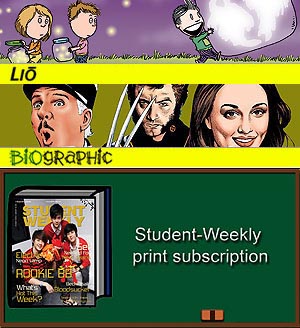
Three stars weather the weather
Did you know
The soundtrack of Love in the Rain features Q Flure and Tor+ Saksit.
By Tatat Bunnag
Photographs by Varuth Hirunyatheb
and courtesy of Sahamongkol Film International
Summer is nearly over, which means that rainy season is on the way. If you’re wondering how to spend your time during the wet weather, then seeing Sahamongkol Film’s latest romantic comedy Reu Doo Tee Chun Ngao (Love in the Rain) might be a nice idea.
Following on from the success of last year’s Kuen Wan Sao Thung Chao Wan Jun (Sat2Mon), Love in the Rain is the second feature film directed by actor and singer Worrawech Danuwong (Dan). The film is about life during the rainy season, which is believed by some to be either a time of romance or a time of loneliness.
Dan also acts in Love in the Rain, along with 31-year-old heart-throb Toni Rakkaen, 23-year-old comedian Chalermpon Thikumporn-teerawong (Jack) and 17-year-old actress Nara Thepnupha.
Student Weekly recently caught up with Toni, Jack and Nara to hear all about the making of Love in the Rain, due to hit cinemas on May 9.

Student Weekly: Can you tell us a bit about Love in the Rain?
Toni: The title might make people think that it’s a sad film, but it’s actually really funny. The movie has loads of hilarious jokes and happy, heart-warming moments.
Nara: Each of the main characters represents somebody from a different generation dealing with feelings of loneliness during the rainy season.
Student Weekly: How did you guys become involved with the project?
Toni: I was asked by the director because we’ve worked together before. Dan told me a while ago that he wanted to make a movie about the rain.
Jack: I think Dan chose the people he wanted to work with before he even wrote the script. Once we all agreed to work with him, he started writing the story with characters based on our real-life personalities.
Student Weekly:Jack, how was your first time acting in a lead role?
Jack: It’s was fun and challenging, but there was a lot of pressure. The director told me that I wouldn’t be typecast as the same kind of character I’d previously played. I was supposed to be funny but less crazy. I also had more dialogue than usual, which was quite tough for me.

Student Weekly:Toni, was it easy to play a character who owns a barber shop, since you’re also a hairdresser in real life?
Toni: It helped a lot because I didn’t have to learn how to cut a hair or hold scissors realistically. The hardest part for me was the romantic scene where I cut the hair of a girl I like. It’s a sexy scene, so it took me a long time to get it right! [Laughs.]
Student Weekly: How many locations were used during the filming?
Nara: We mostly shot the film in Mae Hong Son province in two weeks last December.
Toni: It was winter and the weather was super cold in the Northern provinces. We had to film scenes with artificial rain created by fire truck, and it was really freezing!

Student Weekly: What’s your favourite season of the year?
Toni: I don’t like summer or hot weather at all. I get moody easily during summer. I think winter suits me better.
Nara: Summer is OK for me.
Jack: I like winter and the rainy season. I love cool weather because I’m a warm-hearted guy, so girls probably want to be near me during winter. I don’t do much during the rainy season except sleep.
Student Weekly: What makes Love in the Rain worth seeing?
Toni: It’s a movie for everybody. Most people will be able to relate to the story and the characters.
Jack: The film is also appealing because Dan Worrawech made it. I think Dan always has an interesting point of view about love and romance. Fan of Dan’s music will definitely love this movie as well.
Vocabulary
- weather (v): to come safely through a difficult period or experience
weather (n): the condition of the atmosphere at a particular time, such as the temperature, and if there is wind, rain, sun, etc.
heart-throb (n): a famous man, usually an actor or a singer, that a lot of women find attractive
heart-warming (adj): causing feelings of happiness and pleasure
typecast (v): if an actor is typecast, they are always given the same kind of character to play
dialogue (n): conversations in a book, play or film
realistically (adv): in a way that represents things as they are in real life
artificial (adj): made or produced to copy something natural
moody (adj): bad-tempered or upset, often for no particular reason
point of view (n): a particular way of thinking about or judging a situation



